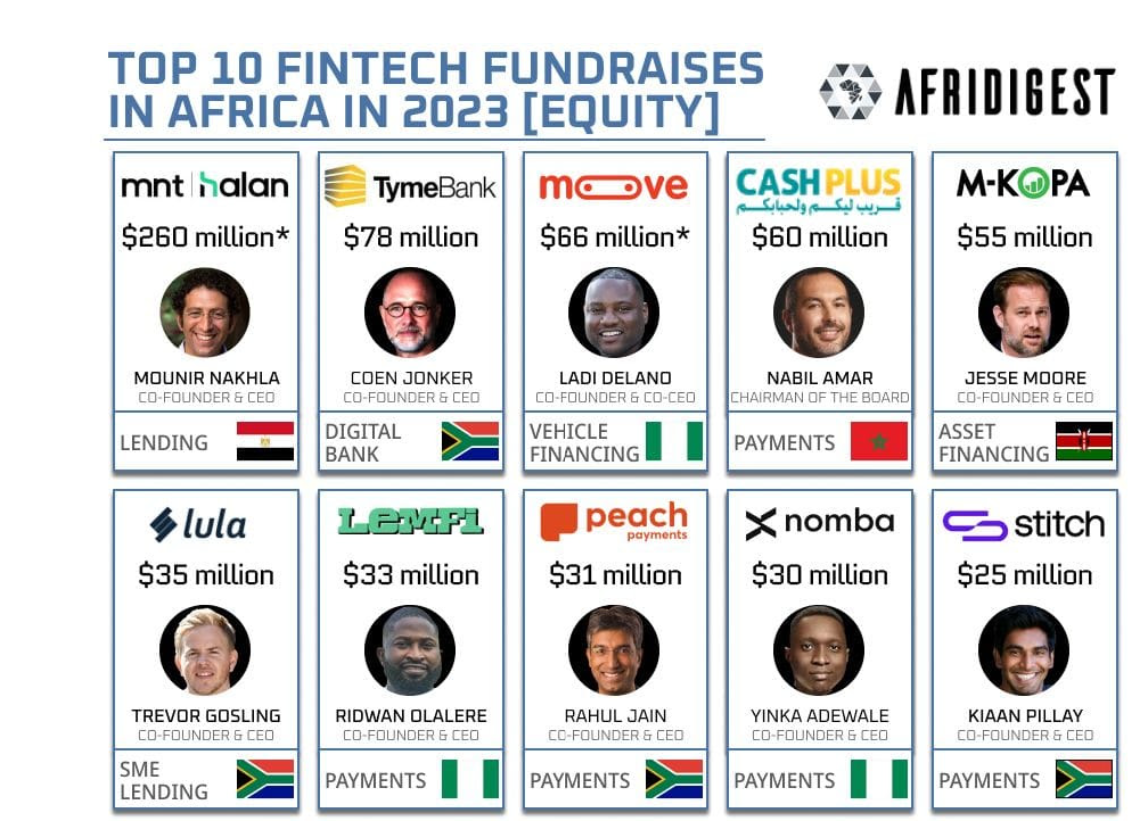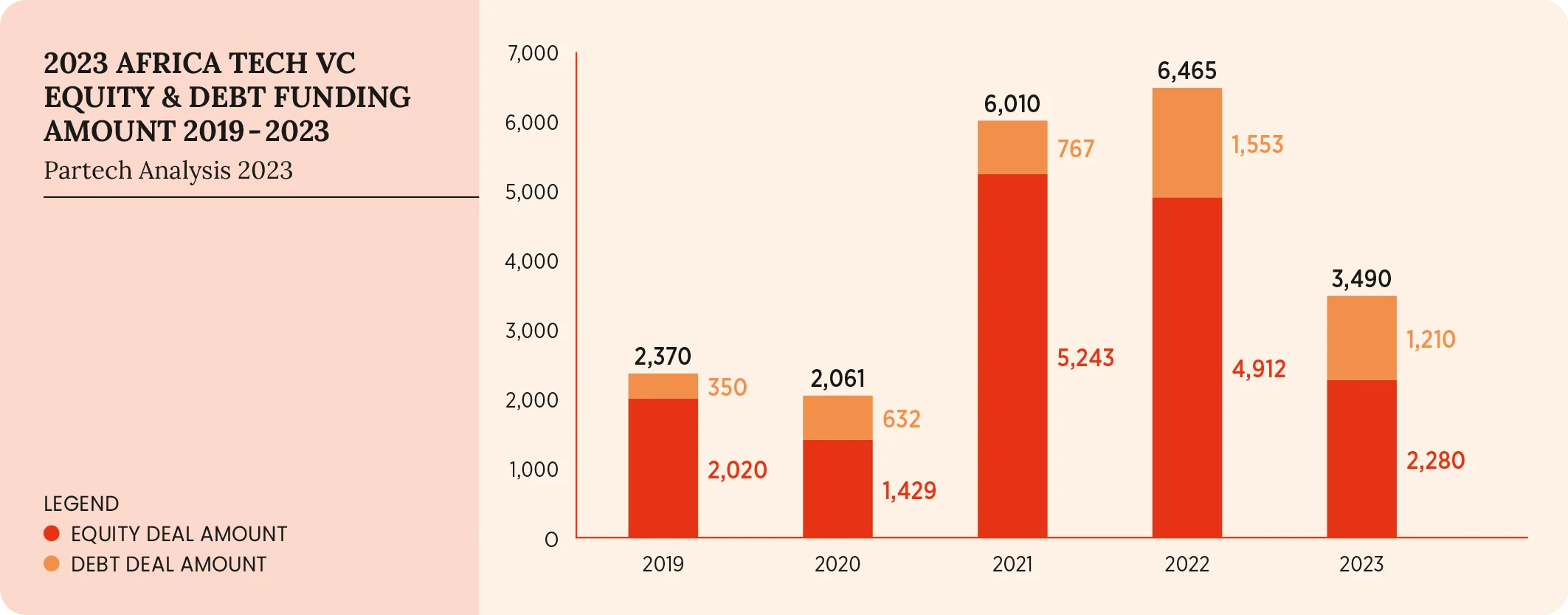
10 African Startups Dominate 75% of Fintech Equity Africa Funding in 2023
by Fintechnews Africa 5 February 2024In 2023, 75% of all equity funding secured by African fintech startups went to ten companies. These firms, which span categories including digital banking and payments, raised a cumulated US$673 million in the top ten fintech equity rounds of 2023, new data released by Afridigest, a media and information services platform focusing on the African continent, reveal.
African fintech startups raised a total US$1.55 billion in capital in 2023, with 58% of that amount (US$900 million) going towards equity financing. Much of that sum went to fast-growing fintech startups, with MNT-Halan, TymeBank and Moove securing the three largest rounds of the year.
Egypt-based MNT-Halan raised the biggest round of 2023, securing US$260 million in equity funding in February and reaching a post-money valuation of about US$1 billion.
MNT-Halan started out as a ride-hailing service before expanding into a super app. Today, the platform provides e-commerce offerings, business loans, consumer finance, payments and buy now, pay later (BNPL) services, among other things. The fintech and e-commerce startup boasts a substantial customer base of more than 1.5 million active monthly users and claims it has so far disbursed more than US$2.5 billion worth of loans. MNT-Halan is now looking to expand internationally after solid growth in Egypt and plans to use the proceeds to develop its product offering.
After MNT-Halan, TymeBank is the African fintech startup that secured the second largest equity funding round of 2023. In May, the startup announced a US$77.8 million pre-Series C round to fuel its expansion into Southeast Asia and its entry into Vietnam.
TymeBank is a South African digital banking startup part of the Tyme Group of companies headquartered in Singapore. The holding company focuses on designing, building and operating digital banks for emerging markets.
Launched in South Africa in 2019, TymeBank offers a transactional bank account with zero or low monthly fees and a savings product to its customers, most of whom are onboarded via physical locations. The startup is said to be one of the world’s fastest-growing digital banks, with over 8.5 million customers.
Following TymeBank, Moove is the fintech startup that raised the third largest equity funding round of 2023, according to Afridigest. In August, the startup announced that it had secured US$28 million equity, alongside US$10 million in venture debt. This followed US$38 million in previously undisclosed funds raised over the prior 12-month period.
Founded in 2020, Moove is a mobility fintech startup that aims to democratize access to financial services for mobility entrepreneurs. It does this by embedding its alternative credit scoring technology onto ride-hailing, logistics, mass transit, and instant delivery platforms, using proprietary performance and revenue analytics to underwrite customers. Moove operates in 13 markets across Africa, the Middle East, Europe and Asia, and is Uber’s largest vehicle supply partner across the region. The startup claims over 12,000 customers.
Moove said at the time that it would use the proceeds to expand globally with plans to launch multiple new products and a goal to reach profitability.
At the fourth and fifth positions are Cash Plus, a Moroccan payment startup which raised US$60 million in October, and M-Kopa, a Kenyan microfinancing startup which secured US$55 million in May.
Cash Plus is a fintech entity and financial network in Morocco on a mission to reshape the country’s financial panorama. The company boasts five brands, 3,600 points-of-sale (POS), and over 1 million digital wallet users. M-Kopa, meanwhile, is a fintech platform that provides digital financial services to underbanked consumers by leveraging data to combine digital micropayments with the Internet of Things (IoT) technology. With operations in Kenya, Uganda, Nigeria and Ghana, M-Kopa’s platform has provided over US$1 billion in credit and enabled 3 million customers to access smartphones, solar power systems, digital loans and health insurance.
The five other fintech startups part of the top ten rounds of 2023 are Lula (US$35 million, Series B), LemFi (US$33 million, Series A), Peach Payments (US$31 million, Series A), Nomba (US$30 million, pre-Series B) and Stitch (US$25 million, Series A extension).
Lulalend is a South African digital lender that’s building a suite of products addressing the challenges faced by small and medium-sized enterprises in managing their finances; LemFi is a Nigerian startup that offers a multi-currency account for immigrants to hold, send, and receive money; Peach Payments is a South African startup providing a toolkit for merchants to accept, manage and make payments via mobile and the web; Nomba is a licensed payment service provider in Nigeria that serves more than 300,000 businesses; and Stitch is a South African startup providing an end-to-end payments solution.

Top 10 fintech fundraises in Africa in 2023 (equity), Source: Afridigest, Jan 2024
Fintech continues to leads startup investment
Data from Afridigest are consistent with estimates from French tech investment company Partech Partners. In its 2023 Africa Tech Venture Capital report, released in January 2024, the venture capital (VC) firm estimates that African fintech startups secured US$852 million in VC funding through 113 deals last year.
The figure marks a 56% reduction from the previous year, yet still accounts for 37% of total equity investment and 24% of all deals, making fintech the biggest recipient of VC funding that year again.

2023 Africa tech VC – Top equity-funded verticals (in US$ million), Source: Partech Analysis 2023
In 2023, the global VC ecosystem faced challenges, resulting in significant changes in investment patterns. Global equity funding saw a sharp decline of 38% year-over-year (YoY) to US$285 billion, while venture debt witnessed a more modest decrease of 5% to US$59.2 billion, data from the report show.
Africa wasn’t immune to these macroeconomic headwinds, ending 2023 with just over half of the funding achieved in 2022. Total funding, including equity and debt, fell by 46% YoY, from US$6.5 billion to US$3.5 billion. The number of completed deals also dropped significantly by 28%, from 764 to 547 deals, marking the first decline in deal count in the ecosystem in the past decade.
In addition to challenges linked to the global macroeconomic environment, the report notes that two key factors contributed to the contraction in funding: first, startups focused on cash efficiency and financial performances over fundraising, and second; investors withdrew significantly form the market, with the number of investors that participated in funding rounds in Africa in 2023 decreasing by 50%.

2023 Africa tech VC equity and debt funding amount 2019-2023, Source: Partech Analysis 2023






No Comments so far
Jump into a conversationNo Comments Yet!
You can be the one to start a conversation.